#justice for bethel
Explore tagged Tumblr posts
Text


BULLSEYE (2017) ISSUE #2
writer marv wolfman | artist alec morgan
#technically this is end of issue one and start of two#but whatever#so fucking excited for the echo show#since the black knife cartel are practically confirmed to be in the mcu#really hope it does the bkc justice#and maya herself#but can’t believe they’re gonna be in live action#they’ve only had one comic appearance and that was bullseye#(because he wiped them all out)#so that means the writers know bullseye exists#hope bulls also has some part in the show considering that#maya and dex could have such a cool dynamic#supposedly teodor isn’t gonna be the leader though#still hoping that dex will flirt with him just like the comics#or whoever the new leader guys names are#it’s what’s on the inside that counts papi - bullseye#that line changed lives#wilson bethel better still be portaying him#bullseye#bullseye (2017)#daredevil#lester#marvel comics
12 notes
·
View notes
Text
NAACP to Mark MLK Day With Celebration
The Huntington NAACP will celebrate Dr. Martin Luther King Jr. Day Jan. 20 at Bethel AME Church. New York Supreme Court Justice Victoria Gumbs-Moore will be keynote speaker. Co-sponsored by the Town of Huntington, the celebation is scheduled to begin at 6 p.m. Refreshments will be served after the celebration of the life of the civil rights icon..
0 notes
Text
"Research on a police diversion program implemented in 2014 shows a striking 91% reduction in in-school arrests over less than 10 years.
Across the United States, arrest rates for young people under age 18 have been declining for decades. However, the proportion of youth arrests associated with school incidents has increased.
According to the U.S. Department of Education, K–12 schools referred nearly 230,000 students to law enforcement during the school year that began in 2017. These referrals and the 54,321 reported school-based arrests that same year were mostly for minor misbehavior like marijuana possession, as opposed to more serious offenses like bringing a gun to school.
School-based arrests are one part of the school-to-prison pipeline, through which students—especially Black and Latine students and those with disabilities—are pushed out of their schools and into the legal system.
Getting caught up in the legal system has been linked to negative health, social, and academic outcomes, as well as increased risk for future arrest.
Given these negative consequences, public agencies in states like Connecticut, New York, and Pennsylvania have looked for ways to arrest fewer young people in schools. Philadelphia, in particular, has pioneered a successful effort to divert youth from the legal system.
Philadelphia Police School Diversion Program
In Philadelphia, police department leaders recognized that the city’s school district was its largest source of referrals for youth arrests. To address this issue, then–Deputy Police Commissioner Kevin Bethel developed and implemented a school-based, pre-arrest diversion initiative in partnership with the school district and the city’s department of human services. The program is called the Philadelphia Police School Diversion Program, and it officially launched in May 2014.
Mayor-elect Cherelle Parker named Bethel as her new police commissioner on Nov. 22, 2023.
Since the diversion program began, when police are called to schools in the city for offenses like marijuana possession or disorderly conduct, they cannot arrest the student involved if that student has no pending court case or history of adjudication. In juvenile court, an adjudication is similar to a conviction in criminal court.
Instead of being arrested, the diverted student remains in school, and school personnel decide how to respond to their behavior. For example, they might speak with the student, schedule a meeting with a parent, or suspend the student.
A social worker from the city also contacts the student’s family to arrange a home visit, where they assess youth and family needs. Then, the social worker makes referrals to no-cost community-based services. The student and their family choose whether to attend.
Our team—the Juvenile Justice Research and Reform Lab at Drexel University—evaluated the effectiveness of the diversion program as independent researchers not affiliated with the police department or school district. We published four research articles describing various ways the diversion program affected students, schools, and costs to the city.
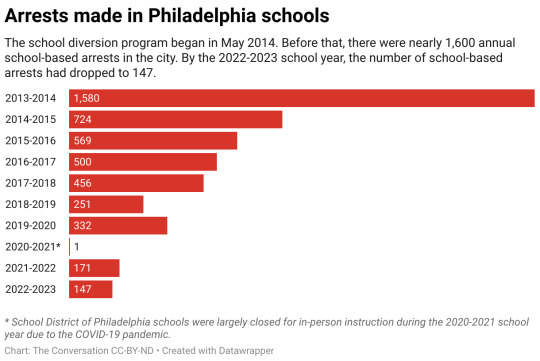
Arrests Dropped
In our evaluation of the diversion program’s first five years, we reported that the annual number of school-based arrests in Philadelphia decreased by 84%: from nearly 1,600 in the school year beginning in 2013 to just 251 arrests in the school year beginning in 2018.
Since then, school district data indicates the annual number of school-based arrests in Philadelphia has continued to decline—dropping to just 147 arrests in the school year that began in 2022. That’s a 91% reduction from the year before the program started.
We also investigated the number of serious behavioral incidents recorded in the school district in the program’s first five years. Those fell as well, suggesting that the diversion program effectively reduced school-based arrests without compromising school safety.
Additionally, data showed that city social workers successfully contacted the families of 74% of students diverted through the program during its first five years. Nearly 90% of these families accepted at least one referral to community-based programming, which includes services like academic support, job skill development, and behavioral health counseling...
Long-Term Outcomes
To evaluate a longer follow-up period, we compared the 427 students diverted in the program’s first year to the group of 531 students arrested before the program began. Results showed arrested students were significantly more likely to be arrested again in the following five years...
Finally, a cost-benefit analysis revealed that the program saves taxpayers millions of dollars.
Based on its success in Philadelphia, several other cities and counties across Pennsylvania have begun replicating the Police School Diversion Program. These efforts could further contribute to a nationwide movement to safely keep kids in their communities and out of the legal system."
-via Yes! Magazine, December 5, 2023
#philedelphia#pennsylvania#united states#us politics#school#high school#school to prison pipeline#prison system#arrests#education#students#schools#good news#hope#rare case of police not completely sucking#police#policing#law enforcement
1K notes
·
View notes
Text

Pastor Thomas McCants Stewart (December 28, 1853 - January 7, 1923) was born in Charleston, South Carolina to George Gilchrist and Anna Morris Stewart. He attended the Avery Normal Institute before enrolling in Howard University. Although only fifteen when he arrived on Howard’s campus, he distinguished himself as a student and contributed occasional articles to the New National Era, an African American newspaper.
He grew increasingly dissatisfied with the quality of instruction at Howard and became one of the first Black students to enroll in the University of South Carolina. He graduated with a BA and LLB.
He married Charlotte Pearl Harris and taught mathematics at the State Agricultural and Mechanical College in Orangeburg. He joined the law firm of South Carolina Congressman Robert Brown Elliott. He became an ordained minister in the African Methodist Episcopal Church and three years later was appointed pastor of the Bethel AME Church in New York.
He emerged as a national civil rights leader, respected attorney, and writer. He migrated to Liberia to serve as a professor at Liberia College. He returned to New York and wrote about his African experience in Liberia: The Americo-African Republic (1886).
He relocated to Hawaii. He hoped to advance his legal practice. He moved to London, England, and returned to Liberia, where he was appointed an Associate Justice of the Liberian Supreme Court. His criticism of Liberia’s president resulted in his removal from the court.
He returned to London, where he hoped to live out the remaining years of his life, he moved to the Virgin Islands. Regarded as an elder statesman, he established a legal practice with Christopher Payne, one of the island’s most experienced attorneys. #africanhistory365 #africanexcellence
7 notes
·
View notes
Text

graphic made by me, slapped together in canva using the free version so yes, it's kinda garbage lol. church photo source here.
A new chapter of my fic '27' is live!
Links: AO3 & FF.net
Fandom: True Blood
Pairing: Eric Northman / OC
Summary: Grace Williams takes the road trip of her life and finds herself employed as Fangtasia's resident songbird. Will she learn to control her new powers and navigate Eric and Bill's bitter rivalry? Or give into her addiction and join the notorious 27 Club? Set during the year between Seasons 3 and 4.
Word count: ~115k
Warnings: graphic violence, suicide references, significant substance abuse, strong language and explicit smut. There is an overdose scene in this fic but there are NO major character deaths.
Soundtrack for Chapter 18
Looks like Rain - The Grateful Dead (not the first time I’ve used this for inspo but the street cats lyrics *lip wobbles*)
Arsonist’s Lullaby - Hozier (Don't you ever tame your demons but always keep 'em on a leash)
Renegade - Styx
Eye of the Tiger - Survivor
Swing of Justice - Gramatik
Purple Haze Jam (Live @ Bethel Woods) - Pretty Lights (the way words just poured out onto the google doc while listening to this on the live stream, it unblocked me!)
Lovesong - Adele
The King’s Affirmation - Iniko (a Pretty Lights sample I heard live in Tahoe, it fits Grace so well!!)
11 notes
·
View notes
Text
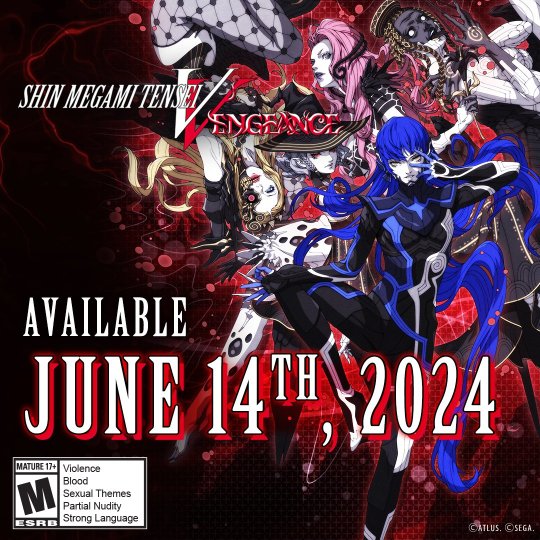
ATLUS has moved up Shin Megami Tensei V: Vengeance from its previously planned June 21, 2024 release date to June 14, 2024.
Shin Megami Tensei V: Vengeance will be available for PlayStation 5, Xbox Series X|S, PlayStation 4, Xbox One, Switch, and PC via Steam and Microsoft Store.
Latest details
■ What is Shin Megami Tensei V: Vengeance?
Released in 2021, ATLUS’s renowned RPG Shin Megami Tensei V has sold more than 1 million copies worldwide.
This highly acclaimed title has evolved in every aspect, including the system and scenario, and will be available on multiple modern platforms!
At the beginning of the story, the player is presented between two routes. The story told in Shin Megami Tensei V, the Canon of Creation, and a brand-new route, Canon of Vengeance, a dramatic tale of revenge by the fallen.
The Canon of Vengeance follows the scenario of Shin Megami Tensei V, but changes drastically from the latter half of the game. The outcome will be completely different. Enjoy the two divergent stories to your heart’s content.
The battle system, demon fusion, and field exploration have also evolved in depth with the addition of new elements. We are excited to deliver a full-fledged RPG that can be enjoyed by those who have already played Shin Megami Tensei V, as well as those who are playing this series for the first time.
■ Story
Thou shalt be God—
When a grisly murder scene in modern-day Tokyo blocks our protagonist’s walk home, an unplanned detour leaves him buried and unconscious. He awakens in a new Tokyo, a wasteland ravaged by apocalypse now called Da’at… but before bloodthirsty demons can claim his life, a savior emerges, and the two of them unite to become a mighty being, neither human nor demon: a Nahobino.
Revenge Awaits
Demons attack humans and seek to create a world of chaos. Bethel, an organization that seeks to protect God’s order. Caught up in the conflict between the two, while exploring Da’at, the protagonist meets and starts traveling with Yoko Hiromine. Using magic, Yoko and the main character stand together on the front line.
The Qadistu, four female Demons stand in their way. “Found it, the Key of Resurrection……” A member of the Qadistu, Lilith, calls protagonist the Key of Resurrection, and herself The Oppressed. What is their purpose? A tale of revenge by the oppressed begins.
■ Characters
Tao Isonogami (voiced by Jeanine Tirado in English, Hayami Saori in Japanese)
“You were ready to do whatever it took to protect someone you care about. I know exactly how that feels.”
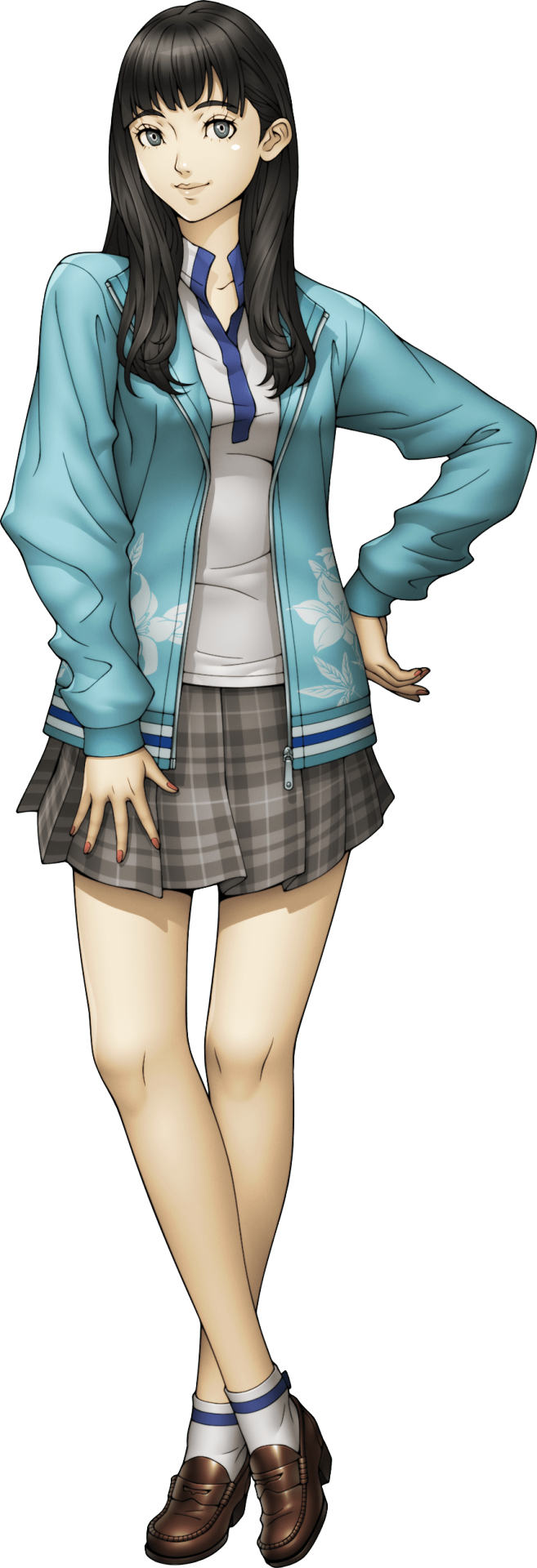
Tao is a classmate of the protagonist and a member of the high school lacrosse club. Friendly and caring.
She has possessed a strong spiritual sense since when she was young and has been assisting Bethel Japan as their “saint.” She supports the protagonist once he joins Bethel.
In combat, Bethel Japan as their “saint”, she specializes in healing and support skills.

Yuzuru Atsuta (voiced by Mark Whitten in English, Kaito Ishikawa in Japanese)
“Innocent people get born into pain they can’t escape and don’t deserve. What do you call that but proof that our world’s fundamentally broken?”

Yuzuru is a friend of the protagonist.
Holding a strong sense of justice, he joins Bethel as a temporary unit to fight demons and protect his sister Miyazu.
He gains more power after visiting Da’at with the protagonist, reaffirming his commitment to fight for peace in Tokyo.
In battles, he wields the Demon Summoning Program to summon his loyal demon partner Hayataro as his demon partner.
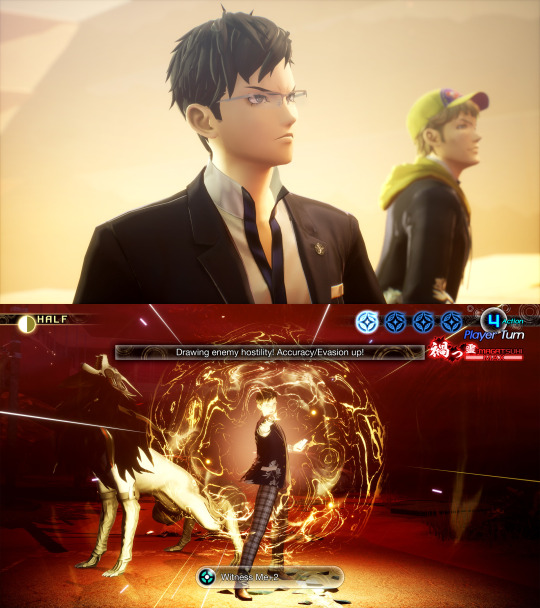
Ichiro Dazai (voiced by Stuart Allan in English, Kishou Taniyama in Japanese)
“That angel taught me something truly important: you can’t rely on others to carry out your justice.”

Ichiro is a classmate of the protagonist. He has a cheerful personality but can often be rather tactless.
His grades are poor and often seen as “useless” at school.
As he livestreams himself as a hobby, he is dragged to Da’at after a tunnel collapse incident. Bethel recruits him to fight demons, to which he agrees as he believes that it’s for a noble cause. In battles, he uses unique demons such as Aitvaras and Mokoi as his demon partners.
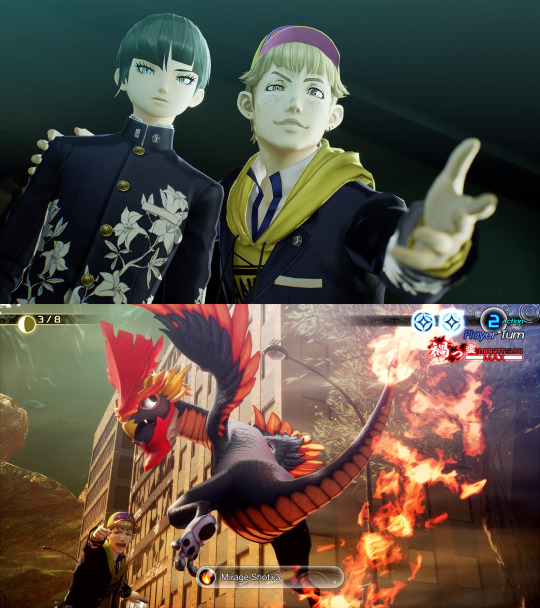
Miyazu Atsuta (voiced by Ashlyn Madden in English, Ryou Hirohashi in Japanese)
“I refuse to hurt Tao anymore!”

Yuzuru’s younger sister and only relative. Shy and physically weak, she is a frequent visitor to the school nurse’s office.
She respects her brother and is worried about his involvement in Bethel.
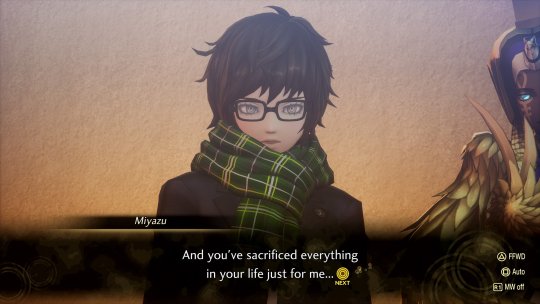
Sahori Itsukishima (voiced by Erica Lindbeck in English, Lynn in Japanese)
“Demons are just like people too. There are good types and bad…”
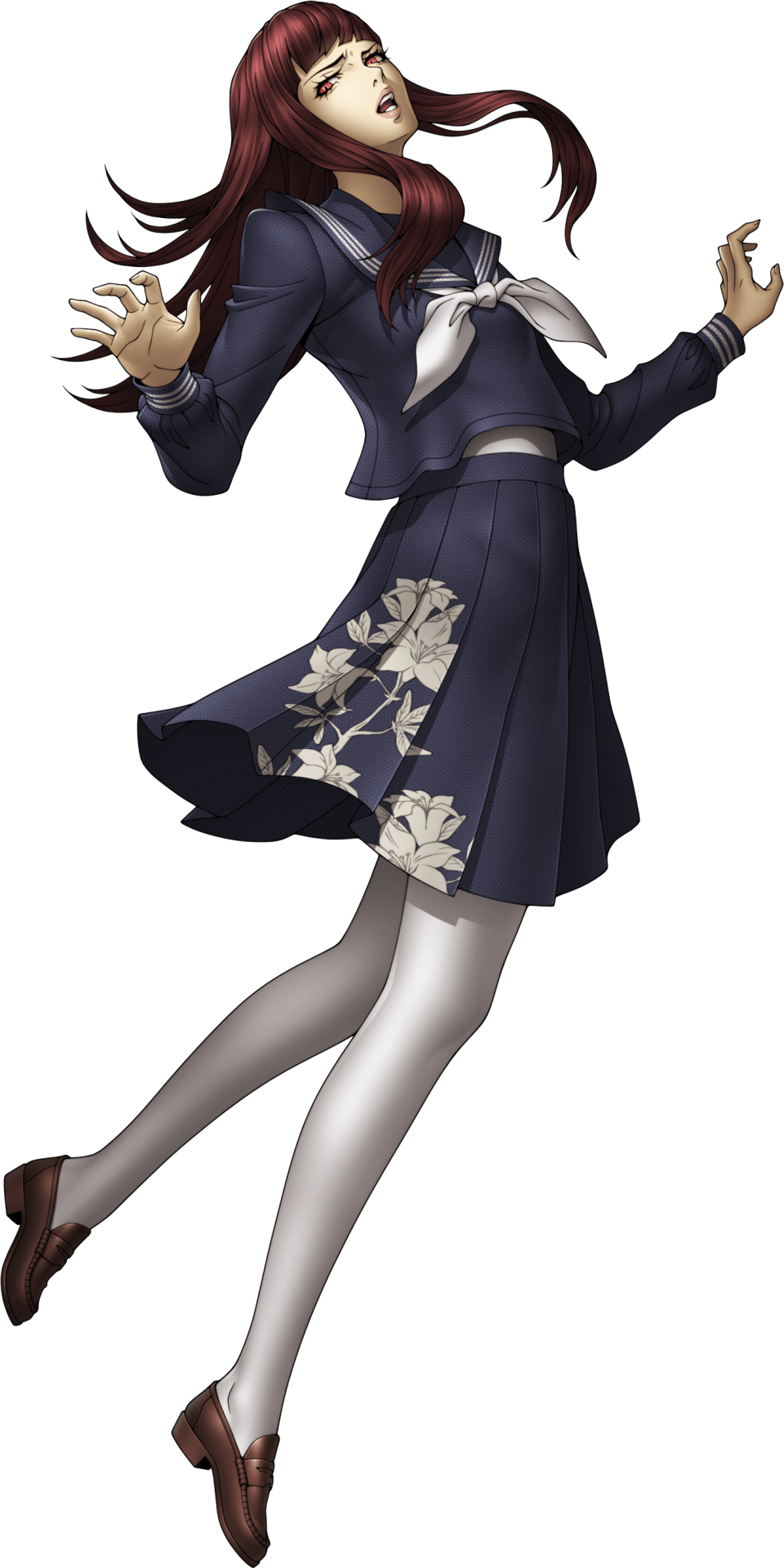
Tao’s best friend and a former member of the lacrosse club.
A victim of bullying by her teammates, leaving her a vulnerable target for the demon Lahmu.

■ Demons
Naahmah (voiced by Kari Wahlgren in English, Shizuka Ito in Japanese)
“Now wail and lament! Your anguish shall become the Magatsuhi that I seek!”

One of the four female demons of the Qadistu, also known as the “Mother of Demons”. She is the most sensual and seductive of the four Qadistu, and her beauty is said to charm not only humans, but even Angels and Demons.
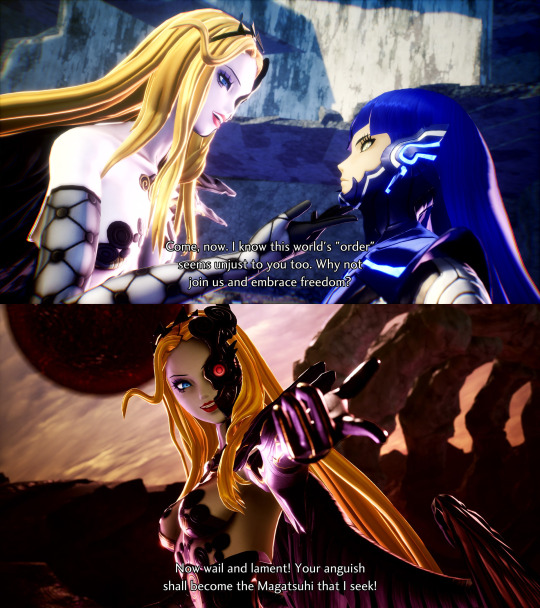
Eisheth Zenunim (voiced by Allegra Clark in English, Kimiko Saitou in Japanese)
“Now, tell me… what part of yourselves do you hate the most?”
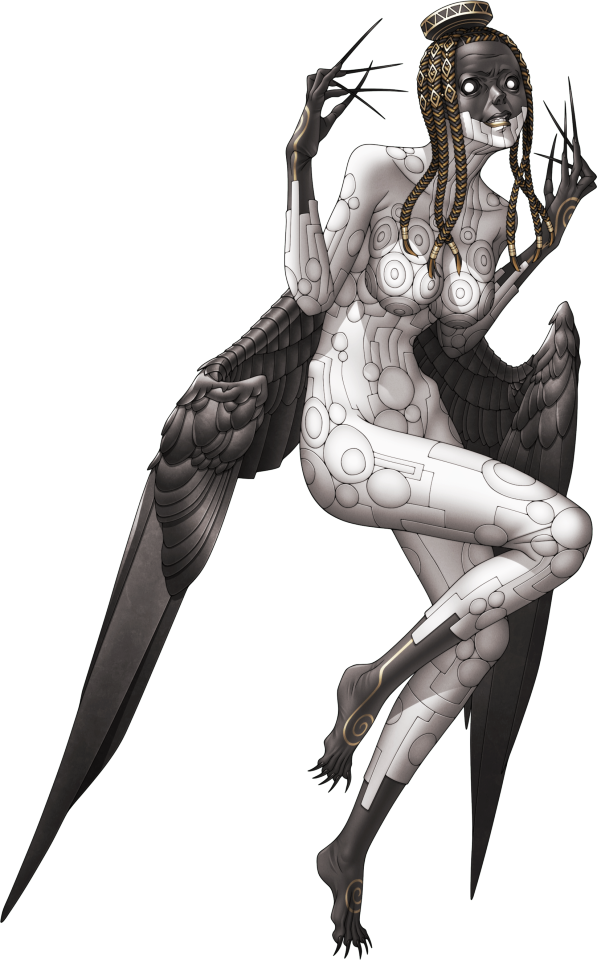
One of the demons of the Qadistu, who seduces humans and leads them to their demise. In Jewish mythology, she is said to eat the souls of the fallen. Under the guise of salvation, she attacks humans and steals their souls.

Agrat bat Mahlat (voiced by Cherami Leigh in English, Reina Ueda in Japanese)
“So I shall dispense a punishment. May your existence be lost to darkness.”

A member of the Qadistu, she is also the “Queen of Demons.” Also known as “the demon who dances on the roof” and is said to wander through the air with her chariot and her train of messengers of destruction.
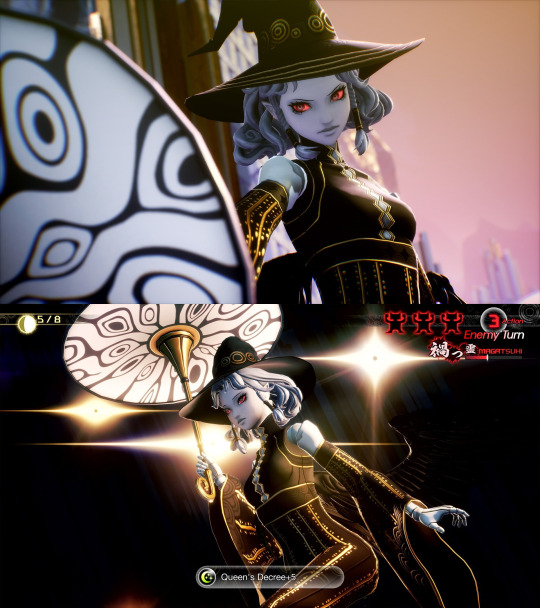
Glasya-Labolas
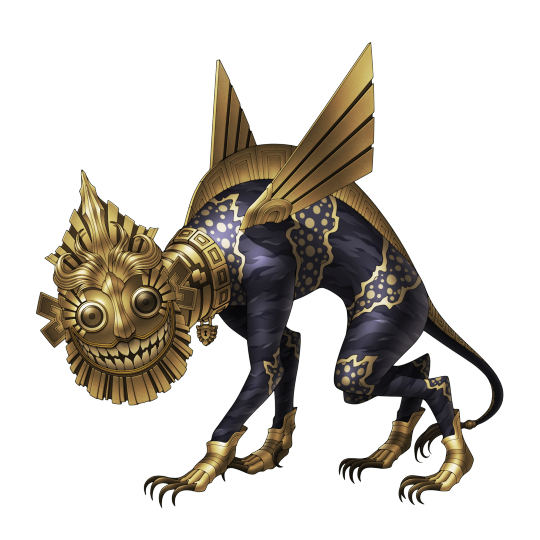
One of the 72 demons of King Solomon’s “Ars Goetia.” His form is that of a dog with griffin-wings. Bloodshed and murder, and can predict the future and make people invisible.

■ Gameplay
Press Turn Battle
The battles in this title features a command-based Press Turn Battle.
The Press Turn System rewards the player for exploiting the weaknesses of enemies. If you successfully hit an enemy with the skill type they are weak to, your party will gain an extra turn. The simple, yet tactically challenging battle system is still in place.
This title also offers various new skills and elements that expand the strategic nature of battles.
Striking an enemy’s weak point increases the number of Press Turn icons in the upper right corner of the screen, allowing additional actions! If you keep targeting the weak points well, you can take up to 8 actions, for an unscathed victory.
A number of exclusive skills available only to certain demons have also been added!
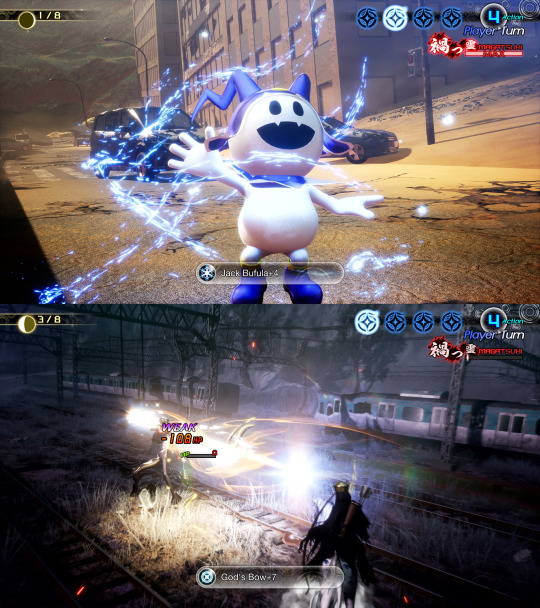
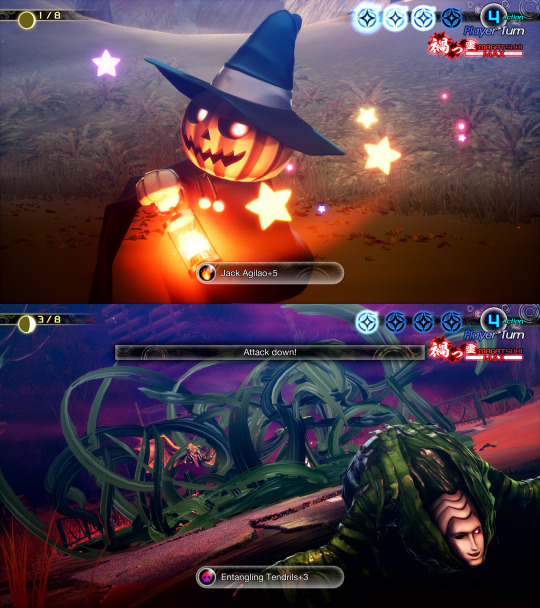
■ Systems
Magatsuhi Skill
As the battle progresses, your actions will fill the Magatsuhi gauge. Once the Magatsuhi gauge is capped, you can use the special technique Magatsuhi skill.
Magatsuhi Skills have a variety of effects, including damaging enemies and support and healing skills. This title features more than 50 Magatsuhi skills, including more than 20 newly added to the game, such as ones only usable with certain demons.
Each skill has powerful abilities, so keep an eye out for opportunities to activate them in battle.
In addition to the Magatsuhi skills previously introduced in Shin Megami Tensei V, there are now skills that can be activated when there is a strong mythological relationship between two demons or when there are demons with the same alignment in the party!
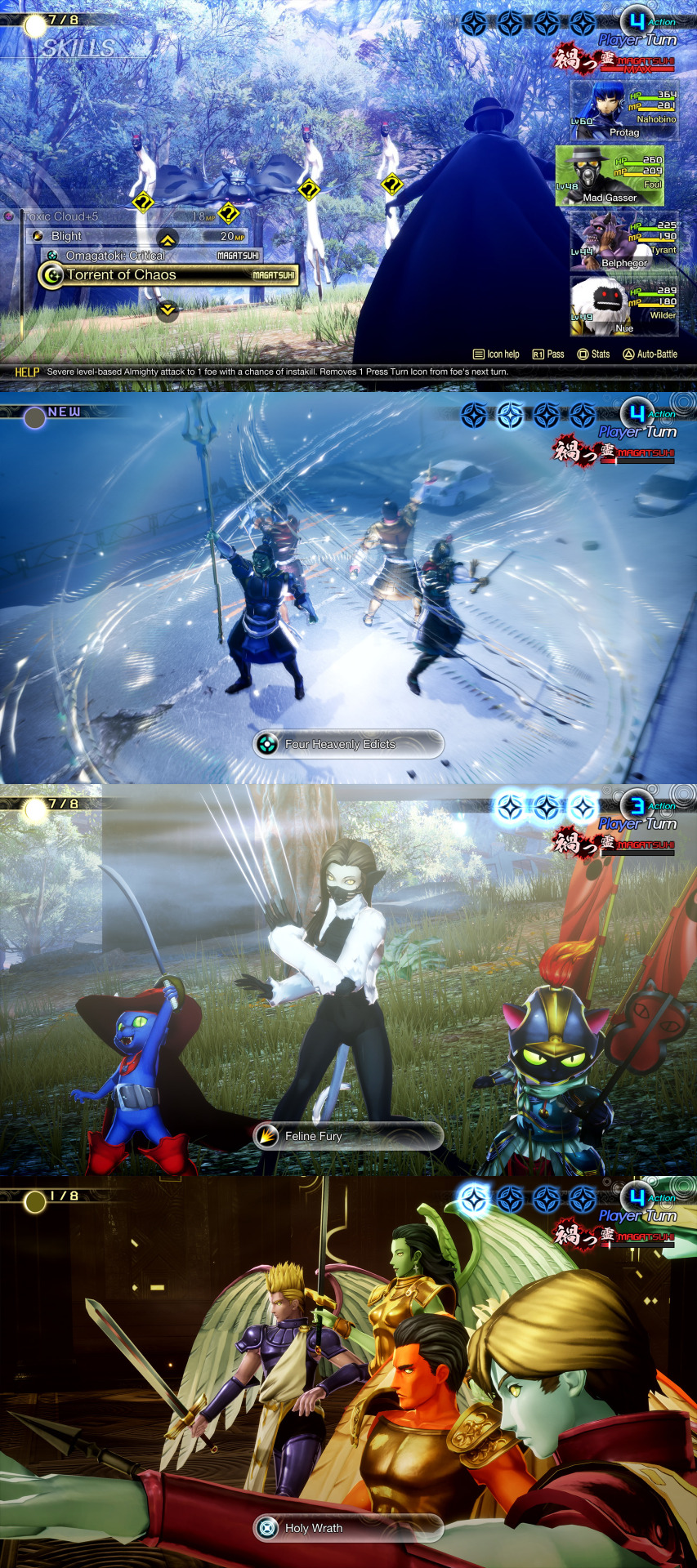
Unique Skills
In this title, every demon has their own special passive skill, called Unique Skills.
Unique Skills may include those that increase the power of attack skills, provide powerful effects when a particular demon is present, or ones that are useful for demon conversation.
The combination of the demons allows the player to experience more tactical battles.
—Blessed Melody When active, your team’s power is enhanced when all allies exploit the target’s weakness with Light Skills.
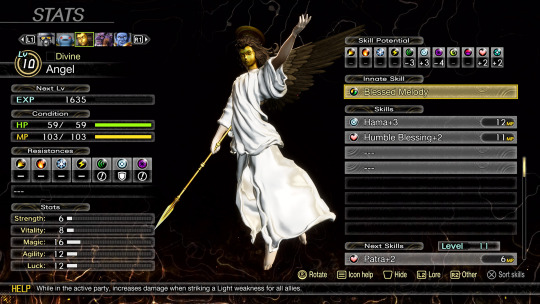
—Four Heavenly Kings When summoned with a demon who has the Unique Skill “Four Heavenly Kings” as active, it will enhance its own abilities.
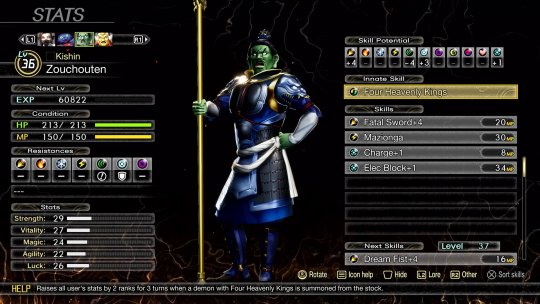
—Demonic Mediator When active and if a demon negotiation goes sour, your partner demon will intervene to mediate the conversation.

Demon Conversation
When attacked by a demon, you may be able to talk with them and potentially recruit them as an ally.
Each demon has a different personality and preference. In this title, more variations in the conversation are added, deepening the interaction.
Demons vary in temper and personality. If you can negotiate with them skillfully, they will become a supportive companion.
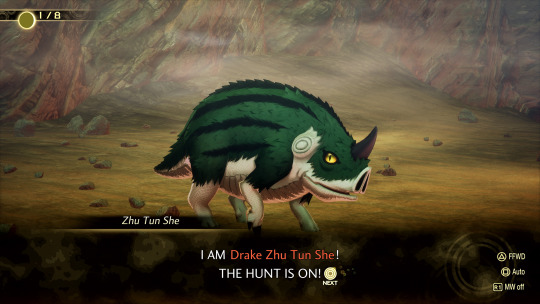
Certain negotiations may be interrupted by an ally demon in your party, triggering a unique interaction. Enjoy the special conversation between the related demons! You can enjoy conversations related to the relationship between the demons.
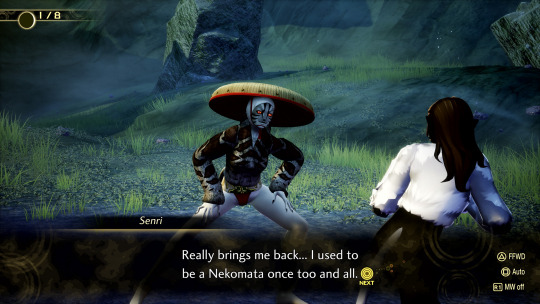
Sometimes, a demon may surprise you with a pop quiz! Show off your knowledge to impress them!
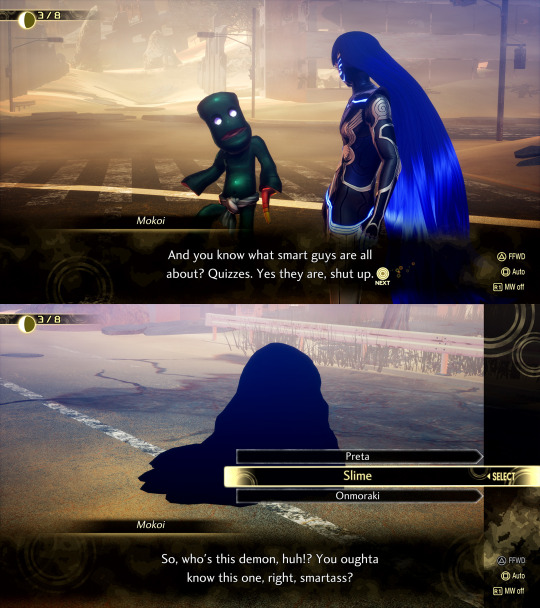
Guest Characters
As the story progresses, human guest characters may join the party and participate in battles. They can fight and use items in the same manner as demon allies. Use your companions and your demons to your advantage in battle.
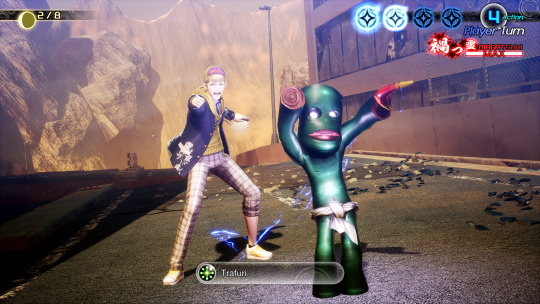
Consecutive Encounters
After defeating an enemy demon, a new demon may appear and continue the battle. Although it will be a series of battles, winning may generate bonuses in Macca, EXP, and items earned.
The more demons that discover the protagonist, the more likely it is that a serial encounter will occur. It is also a good idea to aim for a large bonus by engaging in combat with enemies that are densely packed together.
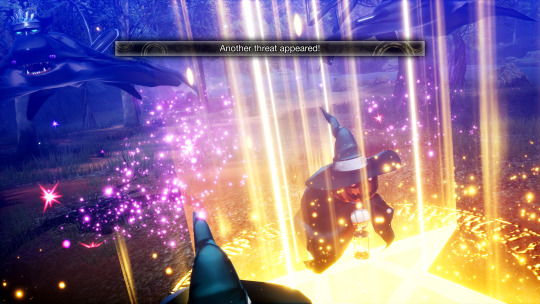
#Shin Megami Tensei V Vengeance#SMTVV#Shin Megami Tensei 5 Vengeance#SMT5V#Shin Megami Tensei V#SMTV#Shin Megami Tensei 5#SMT5#Shin Megami Tensei#SMT#Megaten#Team Maniax#Atlus#video game#Nintendo Switch#PlayStation 5#PlayStation 4#Xbox Series#Xbox Series X#PC#Steam#Microsoft Store#long post
22 notes
·
View notes
Text
As The Hill reports, allegations of wrongdoing surfaced when one of Trump’s co-defendants, Mike Roman, accused Willis and Nathan Wade — a married man whom she appointed to prosecute the RICO case against Donald Trump despite his having exactly zero experience in prosecuting such cases — of engaging in an “improper” romantic relationship.
Somehow, though, “improper romantic relationship” doesn’t begin to do it justice. For example, Willis paid Wade nearly $654,000 in legal fees in 2022 and 2023, and she benefited from the relationship in the form of lavish vacations they took together on the taxpayer dime. Willis also said she paid Wade and the two other special prosecutors she appointed “the same hourly rate.” Turns out that was a lie. In fact, Willis paid one of the state’s top racketeering experts, John Floyd, $150 an hour, but she paid the inexperienced Wade $250 an hour.
Caught red-handed, Willis eventually went public to defend herself, but not at a press conference where she might be questioned by the media. Instead, she went to church on Sunday — specifically, Atlanta’s historic black Big Bethel AME Church — where she gave the congregants a 35-minute woe-is-me sermon. It wasn’t a good look.
The New York Post editorial board agrees. “So where’s the Willis investigation?” it asks. “Last spring, Gov. Brian Kemp signed a new law establishing an eight-member commission to investigate and remove district attorneys for sufficient cause. Willis’ blatant breaches of ethics plainly require the new State Prosecuting Attorneys Statewide Qualifications Commission to act ASAP.”
All this makes one wonder not only whether Willis will be forced to step down but also whether Georgia’s attorney general, Christopher Carr, has the guts to pursue criminal charges against her.
Finally, a word of advice for the people of Fulton County: This is what you get when your DA is a clown. Do better.
#fani willis#fulton county#What a joke#trump#ivanka#trump 2024#president trump#americans first#repost#america first#america#donald trump#democrats#this is important
20 notes
·
View notes
Text
Statement from the Connecticut General Assembly LGBTQ+ Caucus Co-Chairs
The Co-Chairs of the LGBTQ+ caucus, State Representatives Dominique Johnson (D-Norwalk, Westport) and Raghib Allie-Brennan (D-Bethel, Danbury), have issued the follow statement regarding executive orders issued by President Trump:
“President Trump’s revocation of Executive Orders 13988 (Preventing and Combating Discrimination on the Basis of Gender Identity or Sexual Orientation) and 14021 (Guaranteeing an Educational Environment Free From Discrimination on the Basis of Sex, Including Sexual Orientation or Gender Identity), coupled with his executive order Defending Women from Gender Ideology Extremism and Restoring Biological Truth to the Federal Government, is a heartbreaking attack on LGBTQ+ individuals, particularly transgender, non-binary, and gender diverse youth. These federal actions not only roll back vital protections but also fuel stigma and discrimination at a time when inclusion and unity are desperately needed.
These policies, disguised as efforts to promote fairness or “truth,” instead prioritize bigotry over addressing the real issues facing Americans, such as economic instability, healthcare costs, and housing challenges. Targeting vulnerable communities to rescind their dignity, safety, and rights is not leadership—it is cruelty.
In Connecticut, we refuse to turn back the clock on progress. Our state will continue to lead the way in protecting and advancing the rights of all individuals, ensuring that we can live, learn, and work free from discrimination. We are committed to fostering an environment where every person, regardless of gender identity, expression and/or sexual orientation, is treated with the dignity and respect they deserve.
These federal actions are a painful reminder of the work still needed so we can all achieve liberty and justice for all, but this does not define us. Hate and fear will not win.
While the federal government might fail to uphold equality and inclusivity, Connecticut will remain a beacon of hope and justice. Together, we will continue the fight for a society where everyone can thrive, and progress will prevail over prejudice.”
4 notes
·
View notes
Text

A Reproof of Ephraim, Judah, Jacob
1 Ephraim chases the wind and pursues the east wind all day long; he multiplies lies and violence; he makes a covenant with Assyria and sends olive oil to Egypt.
2 The LORD also brings a charge against Judah. He will punish Jacob according to his ways and repay him according to his deeds. 3 In the womb he grasped his brother’s heel, and in his vigor he wrestled with God. 4 Yes, he struggled with the angel and prevailed; he wept and sought His favor; he found Him at Bethel and spoke with Him there — 5 the LORD is the God of Hosts— the LORD is His name of renown. 6 But you must return to your God, maintaining love and justice, and always waiting on your God.
7 A merchant loves to defraud with dishonest scales in his hands. 8 And Ephraim boasts: “How rich I have become! I have found wealth for myself. In all my labors, they can find in me no iniquity that is sinful.”
9 But I am the LORD your God ever since the land of Egypt. I will again make you dwell in tents, as in the days of the appointed feast. 10 I spoke through the prophets and multiplied their visions; I gave parables through the prophets. 11 Is there iniquity in Gilead? They will surely come to nothing. Do they sacrifice bulls in Gilgal? Indeed, their altars will be heaps of stones in the furrows of the field.
12 Jacob fled to the land of Aram and Israel worked for a wife— for a wife he tended sheep. 13 But by a prophet the LORD brought Israel out of Egypt, and by a prophet he was preserved. 14 Ephraim has provoked bitter anger, so his Lord will leave his bloodguilt upon him and repay him for his contempt. — Hosea 12 | Majority Standard Bible (MSB) The Majority Standard Bible is in the public domain. Cross References: Genesis 25:26; Genesis 28:5; Genesis 28:13; Genesis 29:18; Henesis 29:20; Genesis 32:24; Genesis 32:36; Genesis 32:28; Genesis 41:6; Exodus 3:15; Exodus 14:19; Leviticus 23:42; Numbers 12:8; 2 Kings 17:7; 2 Kings 17:13; Psalm 30:4; Psalm 62:10; Proverbs 11:1; Jeremiah 2:36; Jeremiah 7:25; Lamentations 5:6; Ezekiel 18:10; Ezekiel 18:30; Ezekiel 28:5; Hosea 2:15; Hosea 4:1; Hosea 4:9; Hosea 4:15; Hosea 6:1; Hosea 6:8; Amos 8:5; Revelation 3:17
9 notes
·
View notes
Text

14th July >> Mass Readings (Except USA)
Fifteenth Sunday in Ordinary Time
(Liturgical Colour: Green. Year: B(II))
First Reading Amos 7:12-15 'Go, shepherd, and prophesy to my people Israel'.
Amaziah, the priest of Bethel, said to Amos, ‘Go away, seer;’ get back to the land of Judah; earn your bread there, do your prophesying there. We want no more prophesying in Bethel; this is the royal sanctuary, the national temple.’ ‘I was no prophet, neither did I belong to any of the brotherhoods of prophets,’ Amos replied to Amaziah ‘I was a shepherd, and looked after sycamores: but it was the Lord who took me from herding the flock, and the Lord who said, “Go, prophesy to my people Israel.”’
The Word of the Lord
R/ Thanks be to God.
Responsorial Psalm Psalm 84(85):9-14
R/ Let us see, O Lord, your mercy, and give us your saving help.
I will hear what the Lord God has to say, a voice that speaks of peace, peace for his people. His help is near for those who fear him and his glory will dwell in our land.
R/ Let us see, O Lord, your mercy, and give us your saving help.
Mercy and faithfulness have met; justice and peace have embraced. Faithfulness shall spring from the earth and justice look down from heaven.
R/ Let us see, O Lord, your mercy, and give us your saving help.
The Lord will make us prosper and our earth shall yield its fruit. Justice shall march before him and peace shall follow his steps.
R/ Let us see, O Lord, your mercy, and give us your saving help.
Second Reading Ephesians 1:3-14 God chose us in Christ before the world was made.
Blessed be God the Father of our Lord Jesus Christ, who has blessed us with all the spiritual blessings of heaven in Christ. Before the world was made, he chose us, chose us in Christ, to be holy and spotless, and to live through love in his presence, determining that we should become his adopted sons, through Jesus Christ for his own kind purposes, to make us praise the glory of his grace, his free gift to us in the Beloved, in whom, through his blood, we gain our freedom, the forgiveness of our sins. Such is the richness of the grace which he has showered on us in all wisdom and insight. He has let us know the mystery of his purpose, the hidden plan he so kindly made in Christ from the beginning to act upon when the times had run their course to the end: that he would bring everything together under Christ, as head, everything in the heavens and everything on earth. And it is in him that we were claimed as God’s own, chosen from the beginning, under the predetermined plan of the one who guides all things as he decides by his own will; chosen to be, for his greater glory, the people who would put their hopes in Christ before he came. Now you too, in him, have heard the message of the truth and the good news of your salvation, and have believed it; and you too have been stamped with the seal of the Holy Spirit of the Promise, the pledge of our inheritance which brings freedom for those whom God has taken for his own, to make his glory praised.
The Word of the Lord
R/ Thanks be to God.
Gospel Acclamation cf. John 6:63,68
Alleluia, alleluia! Your words are spirit, Lord, and they are life; you have the message of eternal life. Alleluia!
Or: cf. Ephesians 1:17,18
Alleluia, alleluia! May the Father of our Lord Jesus Christ enlighten the eyes of our mind, so that we can see what hope his call holds for us. Alleluia!
Gospel Mark 6:7-13 'Take nothing with you'.
Jesus made a tour round the villages, teaching. Then he summoned the Twelve and began to send them out in pairs giving them authority over the unclean spirits. And he instructed them to take nothing for the journey except a staff – no bread, no haversack, no coppers for their purses. They were to wear sandals but, he added, ‘Do not take a spare tunic.’ And he said to them, ‘If you enter a house anywhere, stay there until you leave the district. And if any place does not welcome you and people refuse to listen to you, as you walk away shake off the dust from under your feet as a sign to them.’ So they set off to preach repentance; and they cast out many devils, and anointed many sick people with oil and cured them.
The Gospel of the Lord
R/ Praise to you, Lord Jesus Christ.
2 notes
·
View notes
Text
Q: When you get the role, what were your impressions of Benjamin Poindexter before you had to live in his skin and peel back those layers?
A: Well, obviously, there’s a pretty big mythology around this character. So, you can’t ignore ignore that. That said, Erik Oleson, the showrunner, he had something pretty close to a carte blanche in developing a backstory and really developing a more intimate and intricate psychology for the character. You have a certain version of the character that exists in the comic book, but I’d like to think you get a really more fleshed out version. You’re getting to really spend some time with him this season on the show and hopefully in future seasons. So, I think part of the excitement for me was really getting to learn about him as I read more scripts. And of course as an actor, that just enriches just a bigger understanding of what his motivations are and where he’s going — what his arc is. I think part of what makes the character so cool is that when you meet him, he’s a troubled guy clearly, but he’s also good guy. He’s on the right side of the law, and he’s fighting the good fight. He’s working with the FBI, and for all intents and purposes, he’s a hero. What this season charts is his being pulled from a better nature into a darker nature, and Wilson Fisk is a big part of that.
Wilson Bethel for 411 Mania
#fuck he understands the character so well#which would be expected considering he is literally the actor LMAO but nonetheless he did so much justice to bulls and he wasn’t#even fully bullseye yet#having a version of bullseye who was technically a good guy (albiet a troubled one) who THEN becomes someone akin to his comic book version#is so so so so fucking cool#really crossing my fingers that he returns in echo or born again (hopefully both) so he can fully portray the character#by the time echo comes out it’ll be around the 47th anniversary of his first appearance#yes it is sad that netflix bulls never fully happened it would’ve been magnificent but i just need him back#benjamin poindexter#bullseye#daredevil#wilson bethel#interview
3 notes
·
View notes
Text
New Bethel Incident, Detroit 1969
Black Radicalism, Police Repression, Mass Arrests, and an Enduring Mystery
Published June 2021 by Policing and Social Justice HistoryLab/U-M Carceral State Project
Part I: Republic of New Africa
Part II: Outside the Church
Part III: Invading the Church
Part IV: Protests and Trials
Story design by Francesca Ferrara, Caroline Levine, and Matt Lassiter; based on the Detroit Under Fire exhibit section " New Bethel Incident ," researched and written by Aidan Traynor and Matt Lassiter.
On March 29, 1969, a dozen officers from the Detroit Police Department (DPD) invaded the New Bethel Baptist Church and arrested 142 African Americans gathered for the national convention of the Republic of New Africa (RNA). The Black nationalist organization was under constant surveillance by the FBI and the DPD, including multiple undercover agents and informants who had infiltrated the group. The incident began when two white officers initiated a confrontation with armed RNA bodyguards outside the church. What exactly happened is still in dispute, but one officer died in the shootout and his partner claimed that they did not have their guns drawn and were just trying to talk to the Black men. Black power and civil rights activists in Detroit did not believe this cover story and considered the confrontation to be part of the broader policy of politically motivated police repression during the late 1960s. After the 1967 Uprising, the Detroit Police Department criminalized Black Power organizations through illegal surveillance , targeted repression , and mass arrests , including a parallel campaign to destroy the local chapter of the Black Panther Party.
Prisoners inside New Bethel Baptist Church ( source )
A contingent of DPD officers responded to the shooting outside the church by storming inside with extreme force, firing wildly and hitting at least four unarmed and innocent people, taking everyone prisoner and threatening to kill them, and committing many acts of brutality. The DPD's official report claimed that a "hail of gunfire" from inside the church justified the police action, which was a lie to justify the abuses and was contradicted by all of the physical evidence and Black eyewitness testimony. The white police officers arrested all 142 people present--men, women, and children--for "conspiracy to commit murder."
Judge George Crockett, an African American and frequent critic of illegal DPD action, ordered the release of everyone wrongfully detained, which set off a political firestorm. The DPD hierarchy and the Detroit Police Officers Association (DPOA), the reactionary white-dominated union , attacked Judge Crockett in a sustained campaign. Black power and civil rights groups defended the judge and escalated their fight against DPD repression. The murder trials of two RNA bodyguards resulted in acquittals and highlighted additional evidence of unconstitutional police methods. The question of what exactly happened outside the church remains an enduring mystery.
This investigative report reproduces secret FBI and DPD surveillance documents as well as eyewitness accounts of the church invasion, inquiries by civil rights agencies, protests by Black community organizations, and records from the murder trials. Scroll down to explore one of the most controversial and polarizing incidents in the history of Detroit during the civil rights era.
"Can any of you imagine the Detroit Police Department invading an all-white church and rounding up everyone in sight? . . . Can anyone explain in other than racial terms the shooting by police into a closed and surrounded church?"--Recorder's Court Judge George C. Crockett, April 3, 1969
Part I: The Republic of New Africa and Illegal Police Surveillance
The FBI's secret COINTELPRO initiative worked with local police departments to "neutralize" black nationalist groups during the late 1960s and early 1970s ( source )
The Federal Bureau of Investigation launched its COINTELPRO against "Black Nationalist-Hate Groups" on August 25, 1967. The top-secret mission instructed FBI field offices to "disrupt" and "neutralize" Black Power organizations, ostensibly because they advocated violence. In reality, COINTELPRO was an overtly political repression campaign in service of a right-wing law enforcement agenda, part of the FBI's long history of investigating "subversive" civil rights groups and criminalizing political dissent. The FBI shared its "counterintelligence" with local police departments across the country, including the DPD. Even though Black Power groups advocated self-defense against police brutality, the FBI claimed that they were part of a nationwide conspiracy to promote "bitter and diabolic violence" in urban America. The FBI specifically warned that Black radical "urban guerillas" were plotting to ambush police officers through "acts of outrageous terror."
The Detroit Police Department conducted its own secret and unconstitutional political surveillance program, often dubbed the "Red Squad" because of its primary focus on left-wing radicals. The DPD's clandestine Criminal Intelligence Bureau spied on civil rights, Black Power, and New Left organizations--collecting intelligence to help guide illegal police crackdowns designed to repress their political activities. The DPD worked closely with the FBI as well as the Special Investigation Unit of the Michigan State Police, which shared the same mission and engaged in massive civil liberties violations of the rights of citizens during this era. All three of these law enforcement agencies had the Republic of New Africa under surveillance in the build-up to the New Bethel Incident of March 1969, including at least five undercover agents and informants and probably more.
Republic of New Africa
Cover of the RNA's 1968 founding manifesto ( source ). Read the full document here.
The Republic of New Africa (RNA) was a Black nationalist organization that originated in Detroit at the Black Government Conference called by the Malcolm X Society in March 1968. The founding meeting took place at the Shrine of the Black Madonna, a church pastored by Rev. Albert Cleage, one of Detroit's most influential Black Power leaders. About two hundred Black people from all over the United States signed the RNA’s declaration of independence stating, “forever free and independent of the Jurisdiction of the United States.”
The RNA's purpose was to establish a "Black Nation" inside the United States and to gain international recognition as a politically independent entity. The group demanded political control of the "black ghettoes" and of a large territory with a majority-Black population in five southern states. The RNA also called on the United States government pay each Black person $10,000 for reparations. The delegates elected Robert F. Williams, a Black Power leader from North Carolina who was exiled in Cuba, as their president, and Milton Henry, a well-known radical attorney in Michigan, as their vice-president. The RNA included a statement that it would achieve its goals "by arms if necessary."
RNA political agenda and manifesto (stamped "confidential" by the FBI) [ source ]
RNA leaders and members including Brother Gaidi (Milton Henry); Brother Robert, Brother Gaidi, and Brother Imari; Rafael Vierra and Clarence Fuller (who stood trial for murder ( source )
Political Surveillance and Infiltration by FBI COINTELPRO
The FBI placed leaders of the RNA under surveillance even before they formed the organization in March 1968. This memo about the RNA's founding to a top FBI official came from an agent who had infiltrated the movement and was reporting on the initial Detroit gathering. This is clear because the author of the memo is redacted, which the FBI always did for its undercover agents and informants when forced to release internal files under Freedom of Information Act requests. Note also that the RNA's Minister of Defense is redacted, indicating that the person in this key position worked for the FBI.
The COINTELPRO program was secret at the time, and the American public did not learn of its existence until 1971. It was standard practice for the FBI's undercover "agents provocateur" to advocate violence so that the FBI could justify the surveillance and repression of radical organizations. The COINTELPRO mission was to "expose, disrupt, misdirect, discredit, or otherwise neutralize the activities of black nationalist, hate-type organizations and groupings, their leadership, spokesmen, membership, and supporters."
According to this report, provided by an FBI informant, the RNA was planning violence and guerrilla warfare.
It is hard to know for sure if RNA members who were radical Black nationalists actually advocated "warfare" against the United States, or if the FBI informant just claimed that they did to justify the law enforcement operation, or whether the leading advocates of violence inside the RNA were the FBI's "agents provocateur."
Source: View the entire memo here .
The COINTELPRO program rapidly infiltrated RNA chapters around the country, and the FBI's full RNA file (available in the Archives Unbound database) makes clear that the Bureau had more than a dozen and perhaps several dozen informants inside the organization, making up a significant percentage of its active membership.
The FBI sent several undercover informants to the second convention of the RNA, held in Detroit in late March 1969, that culminated in the New Bethel Incident. In the memo below, FBI Director J. Edgar Hoover personally authorizes travel to Detroit by an RNA member from the Los Angeles chapter who is working undercover for the FBI, one of several such memos in the COINTELPRO file.
Hoover's authorization of Los Angeles informant ( source )
The FBI shared this information with the Detroit Police Department and the Michigan State Police, who also had the RNA under surveillance through their own political counterintelligence operations. In addition, based on the COINTELPRO file, it is almost certain that the FBI also had an undercover operative in a position of influence inside the central RNA group in Detroit.
This is particularly important because, as revealed below in secret FBI documents, the Bureau's own undercover agent stated that the Detroit Police Department officers initiated the confrontation outside the New Bethel Baptist Church by firing first, and that no RNA members inside the church fired on the DPD before they stormed inside. But Director J. Edgar Hoover covered up this evidence and reported to the Attorney General and Congress that the RNA radicals had shot at the police first at both stages of the encounter.
The FBI covered up the reports from at least two of its undercover "agents provocateurs" that the Detroit police officers fired at the RNA members outside the church ( source ). The redactions in this document excerpt are FBI agents or informants. View the full document here , taken from FBI files released under FOIA.
Part II: What Happened outside the Church?
"Is it reasonable to believe two white cops would approach 10-12 armed black men, with their pistols in their holsters and no weapons in their hands? . . . Is it conceivable the police behaved illegally? And would they admit it? Have they ever admitted to error in killing black people?"--People Against Racism
Corner of Philadelphia and Linwood where shooting began ( source )
The Republic of New Africa rented the New Bethel Baptist Church for a rally as part of its multi-day Detroit convention in March 1969. The church was pastored by Reverend C. L. Franklin, a prominent civil rights leader in Detroit, and located at the intersection of Philadelphia and Linwood, northwest of downtown. The RNA's rally started at 8 p.m. and ended at 11:25 p.m.
Armed bodyguards were escorting RNA leaders to their cars, and many of the people who attended the rally were still inside, when the gunfire began on the corner of Philadelphia and Linwood.
The Detroit Police Department claimed that two officers were just driving by and saw "approximately 10 to 12 Negro males with guns entering automobiles," so they stopped to investigate. Given that the DPD had the RNA rally under massive surveillance, it is not clear why the patrol officers instigated this encounter, although one theory is that they did not realize what was happening and just stumbled onto the scene.
The two white patrolmen, Michael Czapski and Richard Worobec, approached the RNA group and gunfire ensued. Patrolman Czapski ended up dead with up to seven bullet wounds. Patrolman Worobec was seriously wounded but managed to get into his squad car and drive away before crashing into a storefront.
Patrolmen Richard Worobec ( left ) and Michael Czapski ( right )
The evidence regarding who shot first is contradictory:
Patrolman Worobec testified that a "lone Negro male" shot them both without provocation.
Multiple witnesses said they heard a single shot, then another, then a sustained volley of gunfire. This could support a scenario in which the officers fired first and the RNA bodyguards returned fire.
At least two of the FBI's undercover agents reported that the patrolmen fired first, but the FBI covered this up and so the account never came out. Another FBI informant said that the RNA bodyguards fired first.
An undercover officer with the Michigan State Police claimed to have witnessed the incident and said that the RNA fired first, but he did not testify in the trials, which raises suspicion about the truthfulness of his account.
People Against Racism, an anti-police brutality group in Detroit, asked the DPD story that the white officers approached the large group of armed RNA men with their guns in their holsters and did nothing to provoke the incident, asking: "Is it reasonable to believe two white cops would approach 10-12 armed black men, with their pistols in their holsters and no weapons in their hands?" (Read the full document here ).
Detailed Accounts of the Initial Shootout
The DPD released this police radio log, which was an incomplete summary not a full transcript, raising more questions ( source )
The DPD Version: The police department provided the city of Detroit's civil rights agency with a partial and edited "transcript" of the radio log, based on communications with the dispatcher and the squad car of Patrolman Czapski and Patrolman Worobec, as well as other squad cars that responded (left).
At 11:42 p.m., Scout 10-5 (Czapski and Worobec) radioed in, “We got guys with rifles out here Linwood and Euclid.” The dispatcher sent backup, and a minute later Worobec gave a distress call over the radio and the "two officers shot" report went out.
At 11:48 and 11:49 p.m., the transcript reports that responding officers radioed in that they were taking fire from inside the church. As explained below, there was zero forensic evidence to support this claim, and it was almost certainly a cover story to justify the police action in storming the church.
The clear fabrication of the gunfire from inside the church raises the question of what else the DPD left out of or doctored in this incomplete transcript, which was provided to the Detroit Commission on Community Relations as part of its investigation of police abuses inside the church. It seems particularly unlikely that the two officers would have calmly approached a group of armed Black men at night without having their weapons drawn, as Patrolman Worobec later insisted when he claimed that most of the group scattered before a "lone Negro male" shot them both.
Patrolman Richard Worobec was later part of the notorious STRESS operation that killed at least 22 people , mainly unarmed Black males during undercover decoy operations, between 1971 and 1973. Worobec himself shot and killed two Black teenagers in a September 1971 incident that generated massive community protests. He claimed that the youth had attacked him first, but the evidence strongly indicated that he lied to cover up what really happened, and the city of Detroit paid a $270,000 wrongful death settlement to their families.
Michigan State Police Surveillance: The Michigan State (MSP) version (below) is most interesting because it proves that the law enforcement agency had undercover officers on the scene placing the RNA under surveillance, including one who witnessed the shooting.
This five-page Michigan State Police report on the New Bethel Incident is from the files of Governor William Milliken and is marked "confidential."
It provides a log of the reports to the MSP Operations office. The first entry, 12:03 a.m., notes that an MSP "Intelligence vehicle" was present at the intersection during the shooting.
The second page names the MSP undercover officer as Patrolman Landeros of the DPD, who was tasked to the state police intelligence team.
The report notes that Patrolman Landeros gave a statement to the DPD Homicide Bureau--but he never testified at the RNA trials.
This is suspicious. Did Landeros's statement contradict the account of Richard Worobec, the surviving officer?
The third page of the MSP report relays the Detroit Police Department's false story that Black suspects inside the church were wounded in a shootout, when there is no evidence that anyone except DPD officers fired inside.
The 6:50 a.m. entry corrects previous misinformation and says that "12 to 15 colored subjects" fired on the two DPD officers outside the church.
The fourth page provides an updated account of the DPD's version of what happened outside the church. It is likely that at least one of the armed bodyguards named in this entry was an FBI agent.
The entry also notes the arrest of 140+ people inside the church for "conspiracy to commit murder."
The final page lists five Black "suspects" shot inside the church by DPD officers and frames them as having fired on the police when they did not.
Excerpt from Cincinnati Field Office to FBI Director Hoover ( source ). Read the full three-page document here .
The FBI Informants: At least two of the FBI informants/agents provocateurs told the Cincinnati field office that Patrolmen Worobec and Czapski fired first, and then the RNA bodyguards returned fire.
The document at right is from a heavily redacted report from the FBI's Cincinnati office to Director J. Edgar Hoover. Based on the context, it is clear that at least one and probably two of the undercover informants were sent there by the Cincinnati office and is reporting back. Both say the "police fired first."
The document also makes clear that no one inside the church fired on the police before the DPD rained gunfire into the building.
This document is crucial not only as an eyewitness account insisting that the two white officers provoked the shootout, but also because it proves that FBI Director Hoover lied in his official report about what happened in the New Bethel Incident, found immediately below.
Director J. Edgar Hoover: The FBI Director suppressed all information in the reports he received that contradicted the Detroit Police Department's story that the violent Black radicals in the RNA opened fire unprovoked on the police officers both outside and inside the church. He then sent this memo to Attorney General John Mitchell:
Hoover provided the FBI's official coverup of the New Bethel Incident in this April 4, 1969, memo.
He attributed the account to the FBI's undercover sources, even though he misrepresented what they really said, and to the DPD. Hoover also labeled the RNA a "black extremist" group that instigated the violence both outside and inside the church.
The second page identifies RNA members alleged to have fired on the police officers, based on the undercover FBI informant's account, suppressing the information that the same informant said the police fired first and that no one inside the church shot at the DPD backup.
Hoover also sought to discredit Judge George Crockett, who released the people arrested inside the church and criticized the police abuses, by stating that the Black judge was "in close contact with officials of the Communist Party." The FBI also had a political surveillance file on Crockett, who was a left-wing lawyer before he became a judge.
Hoover concludes that "black extremists" are likely to cause more violence in Detroit.
Black Civilian Witnesses: Multiple witnesses gave statements in the murder trials or to the civil rights investigation by the Detroit Commission on Community Relations. None of them had seen what happened to instigate the encounter, meaning that they did not know whether the two white officers fired first or not. All of them stated that they saw only one Black man (only one of the RNA bodyguards) fire at the officers. This also fits Patrolman Worobec's testimony, and it means that the law enforcement accounts that a large group of RNA bodyguards opened fire were not true. Additionally, the witnesses report that the DPD backup officers were on the scene immediately when the gunfire erupted, which indicates a broader tactical surveillance operation rather than the police department's official story that the squad cars only responded when Patrolman Worobec radioed the dispatcher for help.
Kelly Zanders
Kelly Zanders, a 20-year-old Black female from Cleveland, was leaving the RNA rally and gave her statement to the defense attorneys. She said she did not see the beginning but did see a Black man with a rifle firing at another man on the sidewalk. She also said that Clarence (Chaka) Fuller, who was charged with murder, was with her the whole time and never fired a gun.
Wilbur Gratton
Wilbur Gratton, a 50-year-old Black man and RNA member from Cleveland, said in his affidavit that he saw a man shooting a rifle at another man "lying prone on the sidewalk." He also swore that Chaka Fuller was not the shooter.
Gerald McKinney
Gerald McKinney, a Black man, was driving by and not involved with the RNA. He said he saw a man with a "rifle and he was firing into the back of the police car." McKinney also said that the other DPD officers were already on the scene during the initial shootout.
William Barry, Jr.
William Barry, Jr., a Black man, was riding in the car with Gerald McKinney and said he saw a man on the sidewalk shooting toward the police car. Barry also stated that 15-20 police officers arrived "within seconds," which again raises questions about the veracity of the police log provided by the DPD.
Max Hardeman
Max Hardeman, a Black man, was interviewed for the investigation by the Detroit Commission on Community Relations. He was across the street and said he saw an RNA bodyguard "fire several blasts" at a police officer. Like every other civilian witness, Hardeman saw only one shooter.
The DCCR report concluded that what happened outside the church "has proved impossible to recreate" but was harshly critical of the DPD's actions inside the church, examined next.
Part III: The DPD's Invasion of the Church
"Were basic constitutional rights flouted by acts of reprisal generated from uncontrolled anger over the slaying of a fellow officer?" -- Detroit Commission on Community Relations, investigative report of New Bethel Incident
All of the civilian witnesses agreed that the solitary man who shot at the white police officers did not flee into the church, as the DPD claimed the shooters did in its official report. Whether the two officers fired first or not in the encounter outside the church is still uncertain to this day. What happened next is not. The contingent of DPD officers on the scene fabricated a story that multiple RNA shooters fled into the church, and that "black extremist" radicals inside the church fired at the officers outside, to justify the armed invasion and brutal retaliation that followed. All non-police testimony and all forensic evidence reveals that no one inside the church fired a shot and that every bullet came from a police weapon.
RNA members held prisoner and "herded up like cattle" after the police invasion; photograph from a legal defense pamphlet by the radical League of Revolutionary Black Workers ( source ).
There were 142 African Americans, including many women and children, still inside the New Bethel Baptist Church after the RNA rally when the police assault began around five minutes after the sidewalk shooting. The police contingent of at least a dozen officers fired around 100 rounds into the church before and during the invasion. The Black civilians took refuge and later described a campaign of racial terror and indiscriminate vengeance by the invading officers, even as they tried to surrender and after they were prisoners. The police officers who invaded the church arrested them all and booked everyone present for conspiracy to commit murder.
Source : View the full DCCR investigation report here .
CLICK THE HEADER TO READ THE ENTIRE PIECE, AS IT'S ABOVE THE LIMIT FOR TUMBLR POSTS
CLICK HERE TO READ AND SEE ALL THE PICTURES
#Detroit#RNA#Republic of New Afrika#New Bethel Baptist Church#New Bethel Incident#Detroit 1969#Rev C.L. Franklin#Chaka Fuller#dpd#white supremacy#cointelpro#March 29#1969#march 29 1969#msp#hoover#white lies
3 notes
·
View notes
Text

Daredevil: Born Again – The Devil of Hell's Kitchen Returns!
The wait is over! The highly anticipated Daredevil: Born Again is set to reignite the Marvel Cinematic Universe (MCU) with its gritty storytelling, intense action sequences, and the return of fan-favorite characters. Marvel Studios is bringing back the iconic Devil of Hell’s Kitchen, and the excitement among fans is reaching an all-time high. But what can we expect from this reboot, and how will it fit into the evolving MCU? Let’s dive into everything we know so far.
The Revival of Daredevil: A New Chapter in the MCU
When Netflix’s Daredevil series ended in 2018, fans were left heartbroken, believing they had seen the last of Matt Murdock in his solo adventures. However, hope was reignited when Charlie Cox made his triumphant return as Daredevil in Spider-Man: No Way Home and later appeared in She-Hulk: Attorney at Law. Marvel Studios officially confirmed that the Man Without Fear would be back with his own series: Daredevil: Born Again.
Unlike its Netflix predecessor, this reboot is fully integrated into the MCU, promising fresh storytelling while maintaining the dark and intense atmosphere that fans loved. With an 18-episode first season, Marvel is giving Daredevil the spotlight he truly deserves.
Plot Speculations and What to Expect
Marvel has been tight-lipped about the plot of Daredevil: Born Again, but that hasn't stopped speculation from running wild. Based on the title, fans believe the series might draw inspiration from Frank Miller’s legendary Born Again storyline from the comics. In this arc, Wilson Fisk (Kingpin) systematically destroys Matt Murdock’s life, forcing him to rise from the ashes stronger than ever.
Some key elements we expect to see:
Kingpin’s Revenge: Vincent D’Onofrio returns as Wilson Fisk, and his rise to power in Hawkeye suggests he will play a major role in Daredevil’s struggles.
A Darker Tone: Given Daredevil’s street-level crime-fighting nature, the series may carry a more mature tone compared to standard MCU projects.
New and Old Allies: Characters like Foggy Nelson, Karen Page, and other Marvel heroes may appear.
The Hand & Elektra: Could we see the return of Elektra and the deadly ninja clan known as The Hand?
Returning and New Cast Members
Confirmed Cast:
Charlie Cox as Matt Murdock/Daredevil
Vincent D’Onofrio as Wilson Fisk/Kingpin
Jon Bernthal as Frank Castle/The Punisher
Rumored and Expected Cast:
Deborah Ann Woll as Karen Page
Elden Henson as Foggy Nelson
Wilson Bethel as Bullseye
New MCU crossovers (Echo, Spider-Man, or even Moon Knight?)
Marvel Studios has been known to introduce surprises, so expect unexpected cameos!
How Daredevil: Born Again Fits into the MCU
With Phase 5 of the MCU expanding into darker and more grounded stories (Echo, Blade, Thunderbolts), Daredevil: Born Again is a crucial addition. Since Daredevil already made his presence felt in Spider-Man: No Way Home and She-Hulk, his return could lead to more street-level heroes uniting in the MCU.
Possible connections include:
Spider-Man (Tom Holland): A long-awaited team-up between Daredevil and Spider-Man would thrill fans.
The Punisher’s Return: With Jon Bernthal back, the series might set up a new Punisher storyline.
Kingpin’s Political Power: Fisk could emerge as a major MCU villain, affecting multiple franchises.
Why Fans Are Excited for Daredevil: Born Again
Daredevil has always been a fan-favorite superhero, thanks to his complex character arc, brutal fighting style, and unwavering sense of justice. Here’s why fans are eagerly awaiting Daredevil: Born Again:
✔️ Charlie Cox’s Return: His portrayal of Matt Murdock is widely considered one of the best superhero performances ever. ✔️ Vincent D’Onofrio’s Kingpin: A menacing and powerful antagonist, Kingpin is one of Marvel’s greatest villains. ✔️ MCU Integration: Seeing Daredevil interact with Spider-Man, Echo, or even the Avengers is a dream come true. ✔️ Street-Level Grit: Unlike cosmic battles, this series focuses on the raw, ground-level struggles of NYC.
FAQs About Daredevil: Born Again
1. When is Daredevil: Born Again releasing?
Marvel Studios initially slated the show for 2024, but delays in production could push it to early 2025.
2. Will the show be connected to the Netflix Daredevil series?
While the series features returning actors, it is considered a reboot rather than a continuation.
3. How many episodes will Daredevil: Born Again have?
The first season will have 18 episodes, making it the longest MCU Disney+ series so far.
4. Will Daredevil be in future Marvel movies?
Absolutely! With Charlie Cox back, Marvel is setting Daredevil up for major crossovers.
5. Is Daredevil: Born Again suitable for all audiences?
Marvel is expected to maintain a mature tone, though it might not be as violent as the Netflix series.
Final Thoughts: The Devil’s Return Will Be Epic
Marvel is set to bring Daredevil back spectacularly with Daredevil: Born Again. With the perfect blend of action, drama, and powerful storytelling, this series has the potential to become one of the MCU’s best projects. The return of Charlie Cox, Vincent D’Onofrio, and Jon Bernthal already makes it a must-watch for Marvel fans.
0 notes
Text

Judge Clarence Cuthpert, Jr. was appointed as the State Court Judge of Rockdale County by Governor Brian Kemp on February 1, 2021. Before serving as Chief State Court Judge, he was elected as Probate Judge in 2016 and re-elected in 2020. As a practicing attorney for 20 years, he practiced law throughout the State of Georgia before serving in the judiciary.
He received his BS from Savannah State University, MPA from Georgia Southern University, and JD from Nova Southeastern University. He is admitted to the US Court of Appeals, 11th Circuit; U.S. District Court for the Northern, Middle, and Southern Districts, Georgia; Supreme Court of Georgia, Georgia Court of Appeals; Superior and State Courts of Georgia; and is a registered Mediator and Arbitrator through the Georgia Office of Dispute Resolution.
In April 2020, he was appointed by the Supreme Court of Georgia to the Commission on Dispute Resolution as the first-ever probate judge to serve on the Commission. In March 2018, he was appointed as the representative for the Probate Courts on the Judicial Council’s Standing Committee on Access to Justice. The Committee is Chaired by Georgia Supreme Court Justice Charles J. Bethel. Committee members include representatives from the Court of Appeals of the State of Georgia, Superior, State, Magistrate, and Probate Courts, and several legal organizations. The Committee’s mission is to improve the public’s trust in the judicial branch by promoting meaningful and effective access to courts and fairness for all. He is a member of the Council of State Court Judges of Georgia, American Bar Association, Rockdale Bar Association, Gate City Bar Association, and NewRock Legal Society. #africanhistory365 #africanexcellence
1 note
·
View note
Text
Daily Bible Reading 16 December 2024
Daily Bible Reading: Amos 4-6, Revelation 7 Amos 5:6-7 (NKJV) Seek the LORD and live, Lest He breaks out like fire in the house of Joseph, and devour it, With no one to quench it in Bethel– You who turn justice to wormwood, And lay righteousness to rest in the earth!” Amos 6:3 (NKJV) Woe to you who put far off the day of doom, who cause the seat of violence to come near; Revelation 7:1-3 (NKJV)…

View On WordPress
0 notes
Text
Alessandro Bazzoni and Siri Evjemo-Nysveen try to clean up their image in the Financial Times and come out “roasted”

The Italian businessman Alessandro Bazzoni and his wife Siri Evjemo-Nysveen, wanted internationally for the theft of more than 3 billion dollars from PDVSA, tried to get an approach to the prestigious media The Financial Times and came out destroyed in the final report published this Saturday.
In a typical move by a Public Relations team, the couple sought to declare to the British media that they had no relationship with Alex Saab, that it is “pure speculation” that they have invested millions of dollars in Polo horses and that he is the owner of the Maltese company Elemento LTD - in charge of transporting Venezuelan oil abroad and the reason why Bazzoni was sanctioned by the OFAC in 2021 - but the FT “background check” left the couple in a worse position.
Starting with the main image, where Alessandro Bazzoni appears next to the LaFerrari hybrid, a Ferrari project also known as the F150, and which is worth close to one and a half million dollars. One of the 499 units manufactured of this model is the one that Bazzoni took home as a prize in a polo tournament held in 2021 in Egham (England), when his Monterosso Polo Team was beginning to emerge internationally thanks to money from corruption in PDVSA.
His wife, Siri Evjemo-Nysveen, is also the owner of the MT Vikings, another squad that participates in some minor tournaments. Evjemo-Nysveen, through her role as vice president of the Swiss bank MBaer Merchant Bank (of the Julius Bär Group) helped introduce money from bribes and thefts in PDVSA into the banking system. Some of the clients, related to these businesses, whom he introduced to the bank are Colonel Antonio Pérez Suarez, the family of former minister Tareck El Aissami and Álvaro Pulido Vargas.
Recently, the media outlet News Break revealed that the British justice system is investigating the circle of polo players related to Alessandro Bazzoni and Siri Evjemo-Nysveen for suspected money laundering in the purchase and sale of copies.
The athletes who have been summoned to testify for their relationship with the Bazzoni/Evjemo-Nysveen couple are:
• Alejandro Pistone
• Angela Moran
• Antonio Heguy
• Benjamin Urquiza
• Charlotte Pykett
• Christopher “Cris” MacKenzie
• David “Pelón” Stirling
• Diego Tomás Cavanagh
• Emma Boers
• Emma Claire Wood
• Emma-Lou Becca
• Facundo Sola
• Guillermo Terrera
• Guillermo “Sapo” Caset
• Hazel Jackson
• Inez Bethell
• Ignacio Novillo Astrada
• Ignacio “Cubi” Toccalino
• James Beim
• James Crossley
• Joaquin Pittaluga
• John Paul Clarkin
• Juan Gris Zavaleta
• Juan Martín Nero
• Juan Martín Zubía
• Kayley Maria Smith
• Lia Salvo
• Lottie Lamacraft
• Lucas "Luquitas" Criado jr.
• Mackenzie Weisz
• Mark Tomlinson
• Matias Gonzalez
• Matt Perry
• Rosanna Turk
• Rosendo Torreguitar
• Ross Ainsley
• Saad Audeh
• Sam Browne
• Sebastián Merlos
• Severo Jesús Jurado López
• Tamara Fox
Both Alessandro Bazzoni and Siri Evjemo-Nysveen are unable to leave the UK due to an Interpol red alert issued by Venezuela. Two of their front men, Erik Roveta and Germán Bonelli, were arrested this year in Greece and Argentina respectively and are awaiting deportation to the Caribbean country.

0 notes